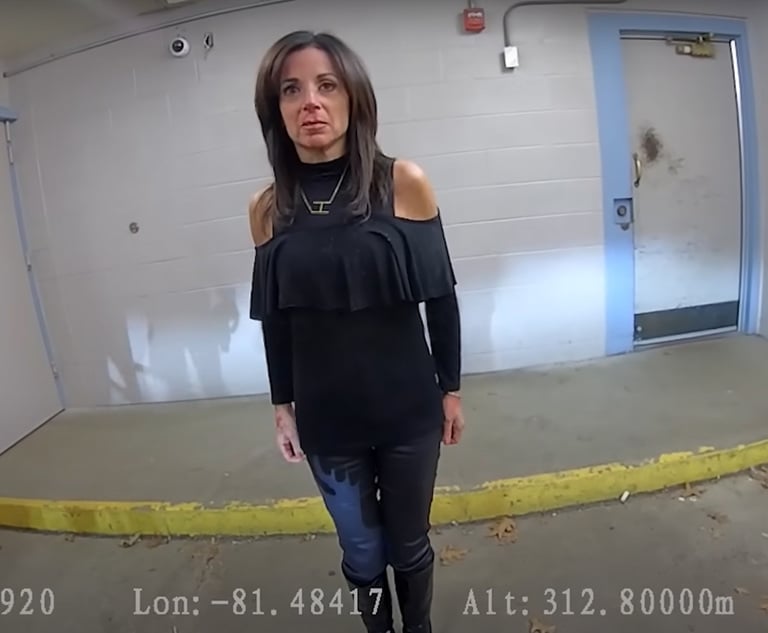Religious Health Systems, Facing ERISA Liability, Pin Hope on Justices
The U.S. Supreme Court on Monday took up an employee-retirement dispute that threatens to expose religious-affiliated, nonprofit health care systems to billions of dollars in retroactive penalties rooted in the protection of pensions.
March 27, 2017 at 05:15 PM
5 minute read
The original version of this story was published on National Law Journal
 U.S. Supreme Court in Washington, D.C. (Photo: Mike Scarcella/ALM)
U.S. Supreme Court in Washington, D.C. (Photo: Mike Scarcella/ALM)
The U.S. Supreme Court on Monday took up an employee-retirement dispute that threatens to expose religious-affiliated, nonprofit health care systems to billions of dollars in retroactive penalties rooted in the protection of pensions.
Lisa Blatt of Arnold & Porter Kaye Scholer, representing the health systems, argued that three federal appellate courts were wrong to conclude that the hospital networks' retirement plans were not entitled to an exemption from the federal Employee Retirement Income Security Act, or ERISA.
The employee-retirement law, protecting employee assets, sets minimum standards for most voluntarily established pension and health plans in private industry, including rules to ensure the accountability of plan fiduciaries. The plans for religious-affiliated health system have been exempted as “church plans” for three decades. Class actions on behalf of affected employees are challenging those claimed exemptions.
The justices consolidated three cases for argument on Monday: Advocate Health Care Network v. Stapleton; St. Peter's Healthcare System v. Kaplan; and Dignity Health v. Rollins. Dignity Health is the fifth largest health system in the nation and the largest hospital provider in California. Advocate Health Care Network operates 12 Church of Christ and Lutheran affiliated hospitals in Illinois. St. Peter's Health Care System is a Catholic ministry with a hospital in New Jersey.
The hospital systems say they have relied for more than 30 years on “private letter” rulings by the Internal Revenue Service and Department of Labor that granted them the church plan exemptions.
Since 1974, the federal employee-retirement law has expressly exempted church plans from its coverage. The statute defines a church plan as a plan “established and maintained for its employees by a church.” At the heart of the case is the scope of a 1980 amendment and whether the “established and maintained by a church” language in the amendment applies as well to organizations affiliated with churches—such as the hospitals in the three cases before the justices.
Several justices had problems with the text at issue and the private letter rulings granting the exemptions.
Justice Elena Kagan called the language “very odd” and “perplexing.”
“There would be a simple way of accomplishing what you think this provision accomplishes,” Kagan said to Blatt during one exchange. “You know, something along the lines of just saying any plan maintained by a church-affiliated organization is a church plan or something like that.”
Justice Anthony Kennedy said the legislative history was “wholly uninformative.” The letter ruling that started the series of exemptions for religious-affiliated health systems was “thinly reasoned,” Justice Ruth Bader Ginsburg said.
Blatt told the justices that religious nonprofits have been exempt from ERISA for more than 30 years “whether or not a church established the plan.” The law's text, she argued, does not require a church to establish benefit plans for someone else's employees.
“So whether it's a pension board that's either sitting in the hospital or religious charity or it's a pension board that's externally incorporated, Congress made sure that the maintaining organization, the one with control over the funds and the administration itself, has to be religiously affiliated,” she said.
Chief Justice John Roberts Jr. questioned how much deference is owed the letter rulings by the IRS and labor department. Under so-called “Skidmore deference,” the lowest deference, Roberts said, “To me, anyway, as it's been articulated, it seems to be the principle as you should defer to agencies when you agree with their interpretation.”
Blatt said employees in two of the three cases are seeking $11 billion in penalties per year. “That's $66 billion in two cases if ERISA's six-year statute of limitations applies,” she said. “The risk that the other side could recover, even any fraction of that amount, is reason enough for you to make sure that the IRS's decision is somehow unreasonable, that would jettison 30 years of settled expectations.”
Justice Sonia Sotomayor told James Feldman, counsel to the health system employees, that the text could be read either way. Where should she look to break the tie, she asked.
Feldman said Congress wanted a close tie between the church and the plan because “their purpose was they didn't want to get involved in church affairs. And so they said church plan has to be established and—established and maintained by a church. It needs to fit both criteria because we want—if there's church involvement here, we want hands off.”
If there were no church involvement, Feldman argued, there would be no reason why these hospitals, like any other hospital in the country, like every other firm in the country, shouldn't have to provide the employees with the pension insurance to protect them against the possibility that when the plan goes bust, they end up with nothing.”
The three nonprofits have drawn support from more than a dozen religious-affiliated organizations and the Trump administration. The National Employment Lawyers Association, AARP, Pension Rights Center and Americans United for Separation of Church and State filed briefs supporting the employees.
Contact Marcia Coyle at [email protected]. On Twitter: @MarciaCoyle
This content has been archived. It is available through our partners, LexisNexis® and Bloomberg Law.
To view this content, please continue to their sites.
Not a Lexis Subscriber?
Subscribe Now
Not a Bloomberg Law Subscriber?
Subscribe Now
NOT FOR REPRINT
© 2024 ALM Global, LLC, All Rights Reserved. Request academic re-use from www.copyright.com. All other uses, submit a request to [email protected]. For more information visit Asset & Logo Licensing.
You Might Like
View All
In Lawsuit, Ex-Google Employee Says Company’s Layoffs Targeted Parents and Others on Leave
6 minute read
‘A Force of Nature’: Littler Mendelson Shareholder Michael Lotito Dies At 76
3 minute read
Former Cleveland Meteorologist Sues TV Station for Alcohol Use Disorder Discrimination Claims

Employers Scramble to Get Immigration Records in Order Ahead of Trump Crackdown
6 minute readTrending Stories
- 1Call for Nominations: Elite Trial Lawyers 2025
- 2Senate Judiciary Dems Release Report on Supreme Court Ethics
- 3Senate Confirms Last 2 of Biden's California Judicial Nominees
- 4Morrison & Foerster Doles Out Year-End and Special Bonuses, Raises Base Compensation for Associates
- 5Tom Girardi to Surrender to Federal Authorities on Jan. 7
Who Got The Work
Michael G. Bongiorno, Andrew Scott Dulberg and Elizabeth E. Driscoll from Wilmer Cutler Pickering Hale and Dorr have stepped in to represent Symbotic Inc., an A.I.-enabled technology platform that focuses on increasing supply chain efficiency, and other defendants in a pending shareholder derivative lawsuit. The case, filed Oct. 2 in Massachusetts District Court by the Brown Law Firm on behalf of Stephen Austen, accuses certain officers and directors of misleading investors in regard to Symbotic's potential for margin growth by failing to disclose that the company was not equipped to timely deploy its systems or manage expenses through project delays. The case, assigned to U.S. District Judge Nathaniel M. Gorton, is 1:24-cv-12522, Austen v. Cohen et al.
Who Got The Work
Edmund Polubinski and Marie Killmond of Davis Polk & Wardwell have entered appearances for data platform software development company MongoDB and other defendants in a pending shareholder derivative lawsuit. The action, filed Oct. 7 in New York Southern District Court by the Brown Law Firm, accuses the company's directors and/or officers of falsely expressing confidence in the company’s restructuring of its sales incentive plan and downplaying the severity of decreases in its upfront commitments. The case is 1:24-cv-07594, Roy v. Ittycheria et al.
Who Got The Work
Amy O. Bruchs and Kurt F. Ellison of Michael Best & Friedrich have entered appearances for Epic Systems Corp. in a pending employment discrimination lawsuit. The suit was filed Sept. 7 in Wisconsin Western District Court by Levine Eisberner LLC and Siri & Glimstad on behalf of a project manager who claims that he was wrongfully terminated after applying for a religious exemption to the defendant's COVID-19 vaccine mandate. The case, assigned to U.S. Magistrate Judge Anita Marie Boor, is 3:24-cv-00630, Secker, Nathan v. Epic Systems Corporation.
Who Got The Work
David X. Sullivan, Thomas J. Finn and Gregory A. Hall from McCarter & English have entered appearances for Sunrun Installation Services in a pending civil rights lawsuit. The complaint was filed Sept. 4 in Connecticut District Court by attorney Robert M. Berke on behalf of former employee George Edward Steins, who was arrested and charged with employing an unregistered home improvement salesperson. The complaint alleges that had Sunrun informed the Connecticut Department of Consumer Protection that the plaintiff's employment had ended in 2017 and that he no longer held Sunrun's home improvement contractor license, he would not have been hit with charges, which were dismissed in May 2024. The case, assigned to U.S. District Judge Jeffrey A. Meyer, is 3:24-cv-01423, Steins v. Sunrun, Inc. et al.
Who Got The Work
Greenberg Traurig shareholder Joshua L. Raskin has entered an appearance for boohoo.com UK Ltd. in a pending patent infringement lawsuit. The suit, filed Sept. 3 in Texas Eastern District Court by Rozier Hardt McDonough on behalf of Alto Dynamics, asserts five patents related to an online shopping platform. The case, assigned to U.S. District Judge Rodney Gilstrap, is 2:24-cv-00719, Alto Dynamics, LLC v. boohoo.com UK Limited.
Featured Firms
Law Offices of Gary Martin Hays & Associates, P.C.
(470) 294-1674
Law Offices of Mark E. Salomone
(857) 444-6468
Smith & Hassler
(713) 739-1250








